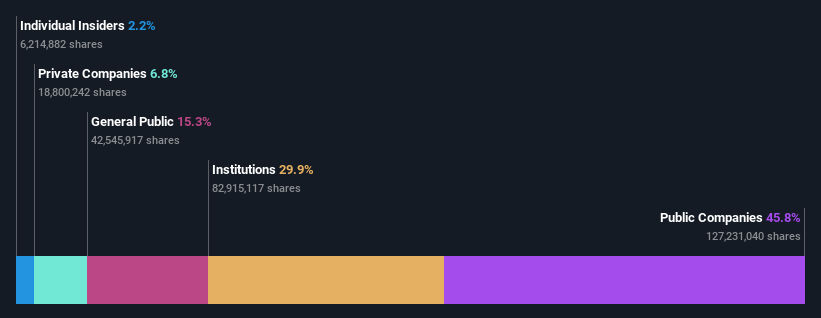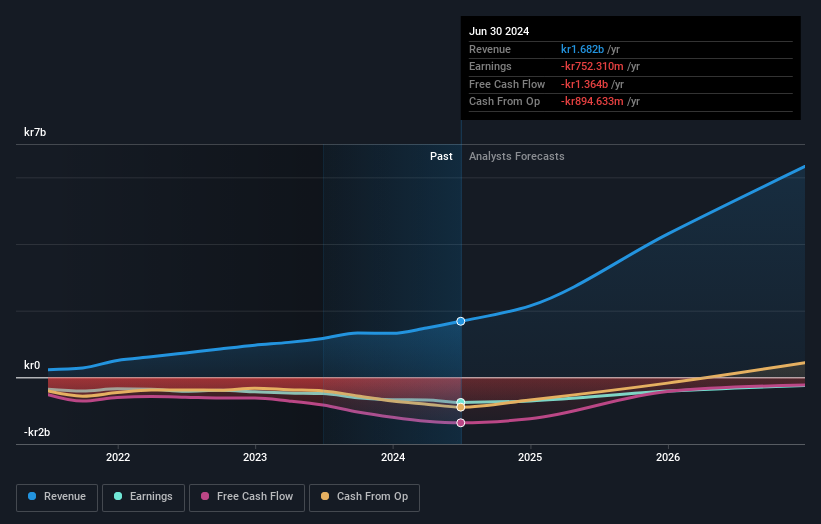Public companies who hold 46% of Hexagon Purus ASA (OB:HPUR) gained 10%, institutions profited as well

Key Insights
- Hexagon Purus' significant public companies ownership suggests that the key decisions are influenced by shareholders from the larger public
- A total of 3 investors have a majority stake in the company with 53% ownership
- Institutions own 30% of Hexagon Purus
To get a sense of who is truly in control of Hexagon Purus ASA (OB:HPUR), it is important to understand the ownership structure of the business. With 46% stake, public companies possess the maximum shares in the company. Put another way, the group faces the maximum upside potential (or downside risk).
Public companies gained the most after market cap touched kr3.0b last week, while institutions who own 30% also benefitted.
In the chart below, we zoom in on the different ownership groups of Hexagon Purus.
View our latest analysis for Hexagon Purus

What Does The Institutional Ownership Tell Us About Hexagon Purus?
Institutions typically measure themselves against a benchmark when reporting to their own investors, so they often become more enthusiastic about a stock once it's included in a major index. We would expect most companies to have some institutions on the register, especially if they are growing.
As you can see, institutional investors have a fair amount of stake in Hexagon Purus. This suggests some credibility amongst professional investors. But we can't rely on that fact alone since institutions make bad investments sometimes, just like everyone does. It is not uncommon to see a big share price drop if two large institutional investors try to sell out of a stock at the same time. So it is worth checking the past earnings trajectory of Hexagon Purus, (below). Of course, keep in mind that there are other factors to consider, too.

Hexagon Purus is not owned by hedge funds. Looking at our data, we can see that the largest shareholder is Hexagon Composites ASA with 38% of shares outstanding. The second and third largest shareholders are Sumitomo Mitsui Trust Asset Management Co., Ltd. and Mitsui & Co., Ltd., with an equal amount of shares to their name at 7.5%.
After doing some more digging, we found that the top 3 shareholders collectively control more than half of the company's shares, implying that they have considerable power to influence the company's decisions.
Researching institutional ownership is a good way to gauge and filter a stock's expected performance. The same can be achieved by studying analyst sentiments. There are plenty of analysts covering the stock, so it might be worth seeing what they are forecasting, too.
Insider Ownership Of Hexagon Purus
While the precise definition of an insider can be subjective, almost everyone considers board members to be insiders. Company management run the business, but the CEO will answer to the board, even if he or she is a member of it.
Insider ownership is positive when it signals leadership are thinking like the true owners of the company. However, high insider ownership can also give immense power to a small group within the company. This can be negative in some circumstances.
Shareholders would probably be interested to learn that insiders own shares in Hexagon Purus ASA. It has a market capitalization of just kr3.0b, and insiders have kr67m worth of shares, in their own names. Some would say this shows alignment of interests between shareholders and the board. But it might be worth checking if those insiders have been selling.
General Public Ownership
The general public-- including retail investors -- own 15% stake in the company, and hence can't easily be ignored. While this group can't necessarily call the shots, it can certainly have a real influence on how the company is run.
Private Company Ownership
Our data indicates that Private Companies hold 6.8%, of the company's shares. It's hard to draw any conclusions from this fact alone, so its worth looking into who owns those private companies. Sometimes insiders or other related parties have an interest in shares in a public company through a separate private company.
Public Company Ownership
We can see that public companies hold 46% of the Hexagon Purus shares on issue. It's hard to say for sure but this suggests they have entwined business interests. This might be a strategic stake, so it's worth watching this space for changes in ownership.
Next Steps:
I find it very interesting to look at who exactly owns a company. But to truly gain insight, we need to consider other information, too. For example, we've discovered 3 warning signs for Hexagon Purus that you should be aware of before investing here.
But ultimately it is the future, not the past, that will determine how well the owners of this business will do. Therefore we think it advisable to take a look at this free report showing whether analysts are predicting a brighter future.
NB: Figures in this article are calculated using data from the last twelve months, which refer to the 12-month period ending on the last date of the month the financial statement is dated. This may not be consistent with full year annual report figures.
Valuation is complex, but we're here to simplify it.
Discover if Hexagon Purus might be undervalued or overvalued with our detailed analysis, featuring fair value estimates, potential risks, dividends, insider trades, and its financial condition.
Access Free AnalysisHave feedback on this article? Concerned about the content? Get in touch with us directly. Alternatively, email editorial-team (at) simplywallst.com.
This article by Simply Wall St is general in nature. We provide commentary based on historical data and analyst forecasts only using an unbiased methodology and our articles are not intended to be financial advice. It does not constitute a recommendation to buy or sell any stock, and does not take account of your objectives, or your financial situation. We aim to bring you long-term focused analysis driven by fundamental data. Note that our analysis may not factor in the latest price-sensitive company announcements or qualitative material. Simply Wall St has no position in any stocks mentioned.
About OB:HPUR
Fair value with mediocre balance sheet.


